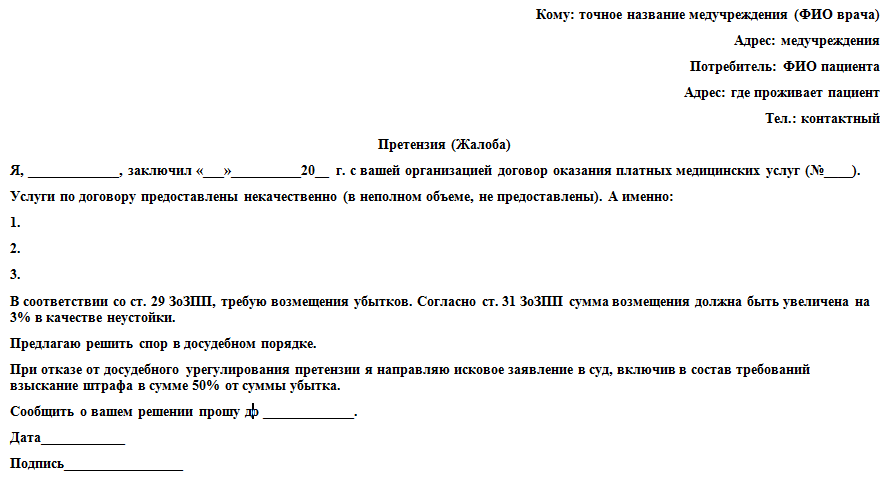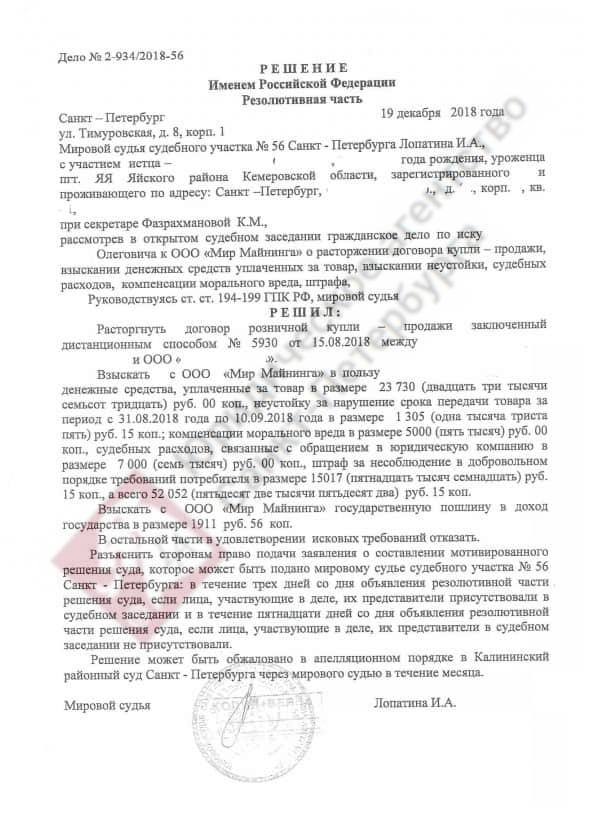To determine who to complain to about medical care, it is important to understand that medical care is a service. In our country, you can receive free treatment under the state program of compulsory health insurance (CHI), using the appropriate policy. Paid treatment is provided in private clinics at the expense of the clients themselves. In both cases, the patient has the right to rely on the Law of the Russian Federation N 2300-1 of 02/07/1992 “On the Protection of Consumer Rights” (ZOPPP).
Quality of medical care
According to Law No. 323-FZ of November 21, 2011 “On the Fundamentals of Health Protection...”, the quality of medical care is:
- Timely medical care provided.
- Correctly chosen method of providing the service.
Quality characterizes the degree of achievement of the set goal. In judicial practice, there are frequent disputes between patients and medical institutions due to the fact that the law does not focus on the correct implementation of the chosen method of treatment. In other words, if the prescription is correct, then this already indicates the correctness of the provision of medical services. There is no need to talk about guarantees of results (achieving the goal) due to the specifics of the healthcare industry.
When do patients usually complain? The most common cases:
- Help was not provided in a timely manner or assistance was refused.
- Misdiagnosis.
- Negligence.
- Too expensive appointments.
- Rudeness and rudeness.
- Damage to health as a result of treatment.
- Wrongly chosen treatment method.
Download for viewing and printing:
Federal Law “On the fundamentals of protecting the health of citizens in the Russian Federation” dated November 21, 2011 N 323-FZ
Federal Law “On the Protection of Consumer Rights” dated 02/07/1992 N 2300-1
Customer Reviews
Gratitude to Pavlyuchenko I express my gratitude to Alexander Viktorovich Pavlyuchenko for the qualified management of my case, competent advice and informed decisions, which led to compensation for all claimed losses.
Best regards, Evgeny Nevinchany
Review by Sokolov M.Yu. I express my gratitude to your company, as well as Denis Yurievich Stepanov and Daria Valentinovna Kutuzova for their conscientious attitude to their duties.
With sincere respect, Sokolov M.Yu.
Gratitude from Marina Kuleshova I express my deep gratitude to Alexander Viktorovich Pavlyuchenko for his competent legal work and professionalism, as well as to his assistant Elena Vladimirovna for the qualified assistance provided. I wish you prosperity and achievement of professional heights.
Sincerely, Marina Kuleshova. 08/15/2018
Thanks to Kavaliauskas V.A. I would like to express my deep gratitude to Vasily Anatolyevich, an employee of your company, for his enormous support and competent defense of my case. And also for having a good attitude towards people. I will recommend your organization to all my friends and family.
I wish you success and prosperity,
05/14/2018
Letter of gratitude to Ermakov A.V.
Gratitude to Sukhovarov I, Dmitry Vladimirovich Korchagin, express my gratitude and appreciation to lawyer Yuri Vladimirovich Sukhovarov for high-quality and qualified advice. Thank you.
Gratitude from Matvey Fomin I, Matvey Alekseevich Fomin, am grateful to Vasily Anatolyevich Kavalyauskas for the timely legal advice and prompt assistance in resolving my issue. Calm and decisive. Thank you.
Fomin M.A.
Gratitude from P.V. Greshina I would like to express my deep gratitude to the employees of your company - Sergei Vyacheslavovich Mavrichev and Konstantin Vasilyevich Solovyov for their enormous support, for their competent explanation and good attitude towards people. I wish you success and prosperity.
Greshina P.V. 03/23/2018
Gratitude from Busygin A.I. I express my gratitude to Vasily Anatolyevich Kavalyauskas for the qualified management of my case, competent advice and justification for the decision, which led to compensation of the stated claims.
Sincerely, Busygin Alexander Ivanovich
26.12.2017
Gratitude from Elena and Alexander I sincerely thank lawyer Vasily Anatolyevich for his qualified and polite service. We will always contact you and tell our friends. Thank you.
Elena
Alexander 998-98-59
Forms of protecting patient rights
There are 2 forms of protecting patient rights:
- Pre-trial (peaceful, claim).
- Judicial.
The claim procedure under the PPA is not mandatory. However, the court will certainly inquire whether the plaintiff tried to resolve the conflict peacefully. If this was done, it will be counted in his favor.
Not only the patient himself can defend the rights, but also on his behalf:
- Representative (legal, by power of attorney).
- Insurer representative (under compulsory medical insurance or voluntary medical insurance policy).
- Prosecutor.
- Ministry of Health
- Public organization.
- Rospotrebnadzor.
How to complain about poor quality medical services in 2020
If there are grounds for a complaint, then the patient first of all needs to contact the management of the medical organization where he was provided with poor-quality service. This can be done in person, in writing, or by mail. At the same time, refusal to fulfill the claim requirements is a good reason for contacting the Prosecutor’s Office, the Ministry of Health, Rospotrebnadzor, public organizations, and, if necessary, the court.
A compelling argument in a dispute with medical institutions is the expert opinion on the quality of the service provided. This will allow the trial to be based on the established fact of guilt, rather than personal biased opinion.
The perpetrators may be held accountable by regulatory agencies, up to and including deprivation of their license. A victim of poor-quality treatment has the right to demand compensation for physical and moral damage, and in disputes with private clinics, seek a refund of payment.
Where to complain about poor quality medical services
The criteria for the quality of medical care are set out in Order of the Ministry of Health No. 520n dated July 15, 2016. It is the Ministry of Health that approves the procedure for providing services for each group of diseases, as well as the corresponding standards.
They are guided by all medical institutions without exception operating within the framework of compulsory medical insurance. Having identified a violation of the approved standard, you can send a claim:
- The head of the doctor who provided poor quality service, the head physician of the hospital. He is obliged to accept the complaint and notify in writing of the result of its consideration.
- The refusal of the clinic management to take action within 30 days gives the patient the right to contact Roszdravnadzor.
- In order to protect your rights, you can contact the Prosecutor's Office with a request to conduct an inspection at the medical institution. The processing time for the application is the same - 30 days.
- Leaving the complaint by Roszdravnadzor and the Prosecutor's Office without satisfaction implies only one option for further proceedings - in court.
If there are signs of a criminal act in the actions of medical workers, then you must contact the police, setting out in a statement all the circumstances of the incident. In this case, the proceedings will take place within the framework of the Criminal Code of the Russian Federation.
How to write a complaint against a doctor at a private medical institution
The patient must understand that in the eyes of the law there is almost no difference between a public and private clinic. In the first case, the services are free, in the second, they are paid. But both private and public doctors are obliged to comply with legal requirements.
There are slight differences in the form of complaints that can be sent to different authorities.
To the Ministry of Health
You can submit a complaint in person at an appointment at a territorial unit, by visiting the institution’s website rosminzdrav.ru, or by mail to the address: 127994, GSP-4, Moscow, Rakhmanovsky lane, 3.
When drawing up a document, follow the rules:
- In the upper right corner they list the exact name of the institution where the document is addressed, as well as their data: full name, address, contacts (e-mail, telephone).
- B, indicating the details of the doctor (clinic, hospital, etc.) for whom the appeal is being made.
- The following briefly lists the circumstances of the conflict. All facts must be indicated: dates, amounts, times, names of drugs, references to violated legal norms.
- All previous appeals to the management of the medical institution, Rospotrebnadzor, etc. must be listed. The results are indicated. Copies of requests and responses to them must be attached.
- List the requirements. This could be compensation for harm, a refund, receiving a quality service, etc.
At the end they put a signature and date. The attachments include all previous requests, as well as documentary evidence (checks, invoices, payment receipts, agreement for the provision of paid services, etc.). A list of applications is listed in the text in the final part.
To the prosecutor's office
There is no point in complaining to the Prosecutor's Office about poor quality service. Here they deal with disputes related to violation of civil rights. Therefore, when drawing up a complaint, it is necessary to be guided by the same principles as when applying to the Ministry of Health, however, it is imperative to cite those norms of civil law that were violated by a private doctor. Without this, the complaint will be left without consideration.
Attention! The review period is 30 days. If the stated facts are considered sufficient to initiate an inspection, it will be carried out. The applicant may be called to participate additionally in the proceedings. The results of the inspection must be reported in writing.
To court
A statement of claim can be drawn up in different ways. The exact form depends on what exactly the plaintiff wants to receive in the end. You can appeal to the norms of the Civil Code of the Russian Federation, the Civil Code of the Russian Federation, the Civil Procedure Code of the Russian Federation, and others. However, any claim must contain complete information about the case:
- Name of the court, personal information of the plaintiff and defendant (institution, doctor, clinic, etc.).
- The essence of the violation. Evidence is provided, as well as references to violated rules of law.
- Claim.
Advice! A lawyer will help you correctly draw up a statement of claim, choose jurisdiction, formulate demands, and refer to violated rules of law. The basic rules for drawing up claims of this kind are set out in Article 131 of the Code of Civil Procedure of the Russian Federation.
My own lawyer
Tweet
In judicial practice, claims against medical institutions arising from disputes regarding poor-quality medical services provided to citizens are becoming increasingly widespread. By their legal nature, these claims are essentially ordinary claims arising from disputes about the quality of services provided (Article 779 of the Civil Code of the Russian Federation). However, cases in this category are classified as complex, since during their consideration before the court questions inevitably arise, the resolution of which requires special knowledge in the field of medicine. In this case, the situation is such that the defendant in the case, the relevant medical organization, has special knowledge. Unlike the plaintiff and the court, which inevitably gives rise to certain difficulties for the court; in particular, it is difficult for the court to determine the circumstances to be proven in such a case, to distribute the burden of proving such circumstances between the parties, and also to determine the means of proving a particular circumstance. This article presents the material and procedural features of this category of cases, taking into account the changes that have occurred in federal legislation in the field of protecting the health of citizens of the Russian Federation over the past three years.
The need to comply with this principle was indicated by the Supreme Court of the Russian Federation in the Review of judicial practice on the application of legislation regulating the appointment and conduct of examinations in civil cases, dated December 14, 2011. Also, when prescribing an emergency medical examination, courts most often raise the question of whether there is a cause-and-effect relationship between the actions of the Ministry of Defense personnel and the adverse consequences that have occurred in the patient’s condition, etc. These issues are of a legal nature, however, according to paragraph 13 of the Resolution of the Plenum of the Supreme Court of the Russian Federation dated June 24, 2008 N 11 “On the preparation of civil cases for trial,” it is unacceptable to raise questions of a legal nature to experts when appointing an expert assessment expert. This position is confirmed by the Supreme Court of the Russian Federation in paragraph 54 of the Review of judicial practice on the application of legislation regulating the appointment and conduct of examinations in civil cases, approved by the Presidium of the Supreme Court on December 14, 2011, which directly states: “... raising questions of a legal nature before experts is unacceptable...” etc.
The results of court decisions allowed the association of doctors of the NSO and the medical community to publicly express concern about this and once again emphasize the complexity and specificity of assessing a doctor’s work from a legal point of view. The peculiarity of activities in the field of medicine is that such consequences of treatment as death and other adverse consequences can occur as a result of the unpreventable course of the disease, i.e. natural. This causes certain difficulties in the legal qualification of the actions of a medical worker.
. The relationship between the plaintiff and the defendant in claims of this category is mediated by the relevant compulsory medical insurance agreement in the manner established by Art. 39 Federal Law of the Russian Federation N 326-FZ “On compulsory health insurance in the Russian Federation. According to this norm, the parties to this agreement are the relevant medical organization and the corresponding medical insurance organization. The recipient of medical care (services) under this agreement is the insured person, who is thus a third party who has the corresponding right of claim against the medical organization. The fact that the relevant agreement has been concluded is confirmed by the patient having a compulsory health insurance policy. The rights of the insured person are determined by Art. 16 Federal Law No. 326-FZ. The compulsory medical insurance agreement, on the basis of which the defendant provided medical care (service), is an agreement between the provider of the service - the medical organization and the insurer of the health insurance company in favor of the insured individual, i.e. an agreement in favor of a third party (Article 430 of the Civil Code of the Russian Federation). Moreover, since payment for medical care (services) provided to the patient is made by the medical organization by the medical insurance organization (CHI), this agreement is of a reimbursable nature (Article 423 of the Civil Code of the Russian Federation). The right of claim under this agreement by virtue of paragraphs. “b” clause 1 part 1 art. 16 Federal Law No. 326-FZ is owned by the insured person (patient). The patient enters into legal relations under compulsory medical insurance and the provision of medical care (services) to him within the framework of this agreement, i.e. to satisfy personal needs, therefore, to these legal relations by virtue of Art. 15 of the Law of the Russian Federation “On the Protection of Consumer Rights” this Law is subject to application.
This, in particular, was directly pointed out by the Supreme Court of the Russian Federation in paragraph 9 of Resolution No. 17 of June 28, 2012 “On the consideration by courts of civil cases in disputes regarding the protection of consumer rights,” which states: “... to relations in the provision of medical services to citizens, provided by medical organizations within the framework of VHI and compulsory medical insurance, the legislation on the protection of consumer rights is applied.”
In this case, one should take into account the fact that the compulsory medical insurance agreement represents the implementation of a citizen’s constitutional right to health care, guaranteed by Part 1, Part 2 of Art. 41 of the Constitution of the Russian Federation, i.e. protection of the personal non-property benefit of a citizen, which, by virtue of the provisions of paragraph 3 of Art. 1112 of the Civil Code of the Russian Federation is not inherited. Thus, the rights under this agreement belonging to the insured person are inextricably linked with his personality and are not inherited. Based on the above, it follows from the provisions of the current legislation that the relationship between the patient and the medical organization in the case of provision of medical care (services) to the patient under the compulsory medical insurance agreement is of a contractual nature.
Claims are, in essence, claims by patients (customers), based on poor quality provision of medical services by the provider, i.e. represent disputes about improper performance by the Ministry of Defense of its obligations under the contract. Claims are also filed by citizens who are or were related by blood to patients who, in the opinion of the plaintiffs, received medical services of inadequate quality (fathers, mothers, brothers, sisters, sons, daughters of patients), as well as persons who are or have been with patients in marital relationships (husbands, wives of patients). There is no agreement regulating the relations between the plaintiffs and the corresponding MO; the relations between the plaintiff and the defendant are of a non-contractual nature, i.e. the legal relations of the parties to the dispute arise from the alleged infliction of harm (Article 1064 of the Civil Code of the Russian Federation), expressed in causing moral harm (Articles 151, 1099 - 1101 of the Civil Code of the Russian Federation), i.e. are of a tortious nature. The peculiarity of this category of cases is that the basis for such claims is essentially a violation of the rights not of the plaintiff himself, but of his relative, spouse, etc., and therefore such a plaintiff has the right to the corresponding claim and the right to satisfy it the court is subject to special study and determination by the court.
The current judicial practice proceeds from the fact that in order to clarify the question of whether medical care (service) was provided to the plaintiff or the victim in a quality manner or not, it is necessary to appoint an emergency medical examination.
The tasks of the Investigative Investigative Committee currently include establishing the factual circumstances of the case, i.e. circumstances that occurred or are occurring in reality and are of an objective nature independent of the will of the parties. When resolving a dispute about the quality of medical care provided, a circumstance of a legal nature is subject to clarification, namely, the compliance of the medical care (service) provided with quality requirements. The resolution of this issue, due to its legal and not scientific nature, cannot be included in the subject of forensic medical examination. Changes in the new legislation in accordance with Art. 64 Federal Law No. 323, part 6 art. 40 Federal Law N 326-FZ defined the goals and objectives of a new type of examination - examination of the quality of medical care (hereinafter - EKMP), which is carried out in order to identify violations in the provision of medical care (services), including assessing the timeliness of its provision, the correct choice of methods diagnosis, treatment and rehabilitation, the degree of achievement of the planned result. Thus, current legislation provides for a new type of examination, specifically designed to assess the quality of medical care (services) provided to the patient. Part 7 art. 40 Federal Law No. 326-FZ, Order of the Federal Compulsory Medical Insurance Fund dated December 1, 2010 No. 230 “On approval of the procedure for organizing and monitoring the volume, timing, quality and conditions of providing medical care under compulsory medical insurance” determined ECM and the legal status of a medical specialist expert in the quality of medical care: examination quality of medical care is carried out by a quality of medical care expert included in the territorial register of quality of medical care experts, the quality of medical care expert is a medical specialist with a higher education, a specialist accreditation certificate or a specialist certificate, work experience in the relevant medical specialty of at least 10 years and trained in expert activities in the field of compulsory health insurance. Taking into account the specially protected nature of legal relations related to the protection of the health of citizens, the legislator has established at the legal level guarantees of the quality of medical care (services) provided to citizens; so, in particular, according to Art. 37 Federal Law N 323-FZ, medical care (service) is organized and provided in accordance with the procedures for the provision of medical care, mandatory for implementation in the territory of the Russian Federation by all municipalities, as well as on the basis of standards of medical care. Objective evidence of the defendant’s compliance with the requirements for the quality of medical care (service) will be evidence of his compliance with the requirements of the standards of medical care (service) when rendering it to the plaintiff or victim. The subject of the examination of the quality of medical care (service) includes the resolution of all issues that will inevitably be discussed by the parties when considering a dispute.
Thus, the examination of the quality of medical care (services) is of a specialized nature and is targeted, its conclusion in accordance with the provisions of Art. Art. 55, 56, 58, 60, 79, 80 of the Code of Civil Procedure of the Russian Federation will be the only admissible and relevant evidence when resolving a dispute about the quality of medical care (services)
Related topics:
- Judicial practice on disputes about property insurance Judicial practice on disputes about compensation for violation of the right to legal proceedings within a reasonable time or the right to execute a judicial act within a reasonable time Judicial practice on loans DISPUTES ABOUT THE QUALITY OF PUBLIC SERVICES PROVIDED New edition of Article 168 of the Civil Code of the Russian Federation - judicial practice
Legislation
The Criminal Code protects the rights of patients. Criminal liability is provided for:
- Failure to provide medical care to a sick or injured person (Article 124). For this, not only the doctor, but also the nurse, the head of the institution, etc. can be punished.
- Death of the patient (Article 109).
- Damage to health due to unqualified treatment (Article 118).
- An abortion performed by a person who does not have the appropriate specialization (Article 123).
- Known danger of HIV infection (Article 122).
- Illegal engagement in medical activities (Article 235).
This is not a complete list of situations falling under criminal law. In a specific case, you should seek advice from a criminal lawyer.
Download for viewing and printing:
Article 131 of the Civil Procedure Code of the Russian Federation
Order of the Ministry of Health of the Russian Federation dated July 15, 2016 N 520n “On approval of criteria for assessing the quality of medical care”
Sample complaint

Sample complaint about poor quality medical services
Filing a claim in court
Jurisdiction of claims is the district court at the location of the medical institution or at the patient’s place of residence.
The form of the document is strictly regulated, so it is forbidden to use colloquial expressions, insult the defendant, etc. It is important to provide not only references to legal norms, but also to attach a sufficient amount of evidence for each fact presented:
- Agreement with a medical institution.
- Receipts for payment.
- Extract from the medical history.
- Copies of prescriptions, prescriptions, diagnoses, diagnostic examinations, tests, etc.
Advice! If, at the initiative of the plaintiff, an independent examination was carried out, then its conclusion is also attached to the claim. It is important to formulate claims that describe the goals of the proceedings: to obtain compensation for harm, compensation, removal of the offender from office, etc.
Implications for the physician
A complaint against a doctor to the Ministry of Health leads to disciplinary action. It could be:
- deprivation of bonus;
- rebuke;
- demotion;
- transfer to another institution or department.
Similar consequences for the doctor are associated with violation of medical ethics. They can be applied repeatedly to the same person. If there is a certain number of reprimands, a doctor can be fired, but such a measure is used extremely rarely.
Also on topic: How to write and submit a complaint to the tax office via the Internet?
FOR YOUR INFORMATION
A separate issue is the legal complaints against the doctor. The Ministry of Health cannot make a decision on them, since only a court can make a verdict. In this case, the doctor faces a fine, imprisonment, deprivation of the right to engage in medical activities for up to 2 years, or forced community service. Similar penalties are specified in Article 118 of the Criminal Code of the Russian Federation.
Protecting patient rights
We must not forget about insurers. In case of a dispute with a medical institution within the compulsory medical insurance structure, you must contact the insurer that issued the compulsory medical insurance policy. If there is a VHI policy, the insurer is also obliged to assist the client in resolving disputes with a doctor or clinic.
You need to seek help from the insurer along with filing a complaint with the management of the medical institution. In the future, the assistance of an insurance company specialist will be useful at all stages of the proceedings.
Court decisions

The car dealership does not give away the car
Dispute with LST Development LLC over unfinished construction in Yanino
Let's go to peace: How diplomatic successes saved your wallet

Online scammers: the case of a missing online store
How to get your money back for a robot vacuum cleaner that didn’t live up to expectations
The case of balcony cladding: how to find justice for an unscrupulous contractor






